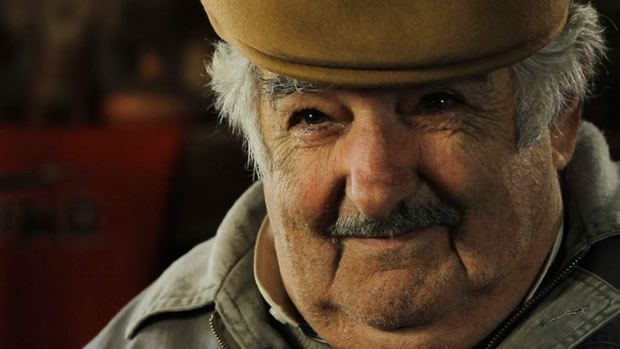
El Pepe
José Mujica does not rule out selling flowers again, once he finishes what he calls “this presidential gig.” He also plans to set up a school of agriculture in his home, for the children of low-income families.
In March 2015, he will turn over his presidential sash to a successor and plans to adopt, like any other Uruguayan, about 30 or 40 “gurises pobres” [poor peasant kids] who would live with him and learn to work the land.
The plan is just a sample of the thinking of a politician who surprises those who “discovered” — oh, what a rare finding nowadays! — a man of the people in the man of State. The media and social networks have nicknamed him “the world’s poorest president” and even “the most excentric president in Latin America,” because in this world (unfortunately) modesty has become somewhat exotic.
Mujica replies with his truth: he is not poor, because he doesn’t need much to live on. He prefers to travel light, and austerity helps him to “stay free.” Such arguments, however, only magnify the amazement of his listeners.
Listening to his impromptu speeches (his latest, in Havana, was simply magnificent), one can appraise the richness of this president, who donates 87 percent of his salary to his party and to social programs for the construction of homes. He has never moved from his very humble farm in Rincón del Cerro, some 10 kilometers from Montevideo, publicly snubbing the comfortable presidential dwelling.
At a time when, through luck and choice, Latin America has several valuable leaders, the fresh oratory of this 79-year-old man — who speaks with the tenderness of a child, the poetry of nature and the forthrightness of a wise man — is invigorating.
Though always bold, Mujica was not always docile. His body was hit by six bullets and his record as a Tupamaro guerrilla sent him to prison for 14 years. In the worst days, the cell was a hole in the ground. He spent more than one year unable to bathe, seven years with nothing to read. His only friends were some frogs, some mice and some ants, which he placed in his ears for fun. He shared bread crumbs with all.
Contrary to what usually happens, prison multiplied his humility, taught him to “gallop on the inside” and convinced him that hatred is useless in politics. Thousands of Uruguayans waited for him outside the prison in autumn 1984. In 2010, when he took the presidential oath of office, we could better understand what they saw in that immate who regained his freedom.
Since then, it has become evident that his manners don’t fit any pattern. Very early, he made clear that he didn’t need a necktie to work. He sold the presidential summer home in Punta del Este and donated the proceeds to the state. He remained in his modest home with his wife, senator Lucía Topolansky. To go to work as the nation’s chief executive, he drove a 1987 Volkswagen Beetle, a museum piece. Mujica lives like just another neighbor, a tradition most politicians abandon as soon as they slip on the presidential sash.
He still plants flowers, gives away his best lettuces to the neighbors and shows up unannounced at bars frequented by nameless people to find out how the world’s going. He still summons a barber to trim his hair at home. Manuela, his lame dog — injured in an accident one day the president was operating a tractor — acts more like a bodyguard than the two policemen who, despite the president’s refusal, were stationed outside the old tin-roofed house at the end of a dirt road. Decidedly, José Mujica is too much for today’s standards.
Despite four years in the presidency, his neighbors still call him El Pepe, the familiar nickname for anyone named José. And El Pepe has anecdotes worthy of being included in the political lessons that are needed to save the world. One time, some second-division soccer players found him with Manuela in a local hardware store where he went to buy a toilet seat and ended up engaged in a brisk conversation about sports, as the president stood holding the singular device, the dog by his side.
Another day, without warning, some Argentine citizens who publish a community newspaper showed up at his home, and the president gave them the interview they asked. Last September, he attended the swearing-in of his new minister of the Economy wearing sandals.
There’s more. Not long ago, Paraguayan security guards barred Mujica from a luncheon given by Paraguay’s newly elected president, Horacio Cartes. The reason? Mujica’s garb. “We knew that he was austere, but this much?” the bodyguards explained.
Like others, El Pepe has detractors and sympathizers. Among the latter are people worldwide, some of whom have nominated him for the Nobel Peace Prize. “They’re crazy,” Mujica reacted. “A prize like that could bring some money to build houses for poor women. But peace is carried within oneself.”
No matter what he says, some of his actions seem to contradict him because they deserve a Nobel prize for authenticity. In 1994, Mujica went to Congress to be sworn in as a deputy. He arrived in his old Vespa scooter, wearing a sweat suit, and the parking-lot attendant asked him: “Sir, will you remain here very long?”
“Unless they throw me out, four years,” El Pepe replied.

